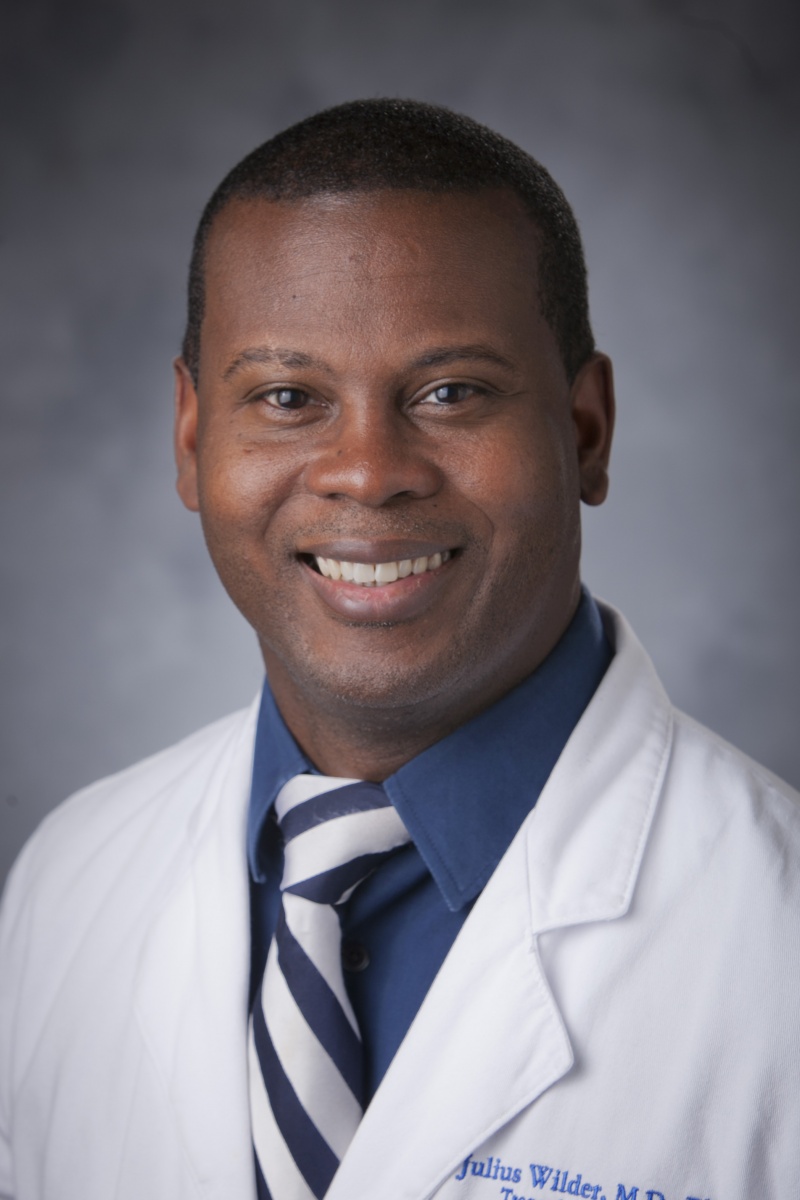The Department of Medicine's giving campaign to support BOOST (Building Opportunities and Overtures in  Science and Technology) is going on now through Dec. 31.
Science and Technology) is going on now through Dec. 31.
Our own Julius Wilder, MD, PhD, assistant professor of medicine (Gastroenterology), served as a mentor for BOOST when he was a Duke MD, PhD medical student in graduate school. Dr. Wilder shared his perspective on BOOST and the impact the program has had on him and his former mentees.
Your involvement started with BOOST as a mentor while you were a MD/PhD student in graduate school, how many BOOST scholars did you work with?
Wilder: I have worked with four BOOST scholars. My first two years I worked with two young boys. My second year I worked with two young girls.
In reflecting on your time as a mentor at BOOST, can you recall scholars who had started and then progressed through the BOOST programs, and how the program directly impacted their interest in science?
Wilder: I saw tremendous in growth in all of the mentees I had. None of them had previous experience in science research. Furthermore, none of them were aware that opportunities in STEM existed like a PhD in basic science research. Most of them were aware that one could be a doctor. But they were unaware of the myriad of other opportunities out there in science. Following BOOST, they all described a increase in science, and most of all, a new curiosity for the possibilities of careers in STEM.
What are some of the BOOST activities you remember doing with scholars when you were a mentor? What types of STEM activities are students exposed to?
Wilder: I tried to balance STEM with mentorship and guidance outside of STEM. I took my mentees to fun things like the museum, Frankies, Duke Gardens, a Duke Women's basketball game, and had them over to my home for video games and dinner. But, the bulk of our time was spent doing their homework, as well as working on their science projects. My PhD was in sociology, but my wife was working on her masters pf pharmacology and had a wet lab. My scholars spent time in that lab, and we worked on their experiments for the BOOST program science project. Some other BOOST mentees worked with their mentors on engineering projects, projects in aeronautics, and computer programming.
Scholars complete a research project with BOOST that they present at the annual end-of-the year BOOST Science Symposium. $500 = STEM kit for a whole BOOST squad to help with this project. What were some of the projects students researched or areas they can explore thanks to BOOST?
Wilder: The projects are across the entire spectrum of science, math, and engineering. I recall being extremely impressed not only with the quality of the projects but with the knowledge the BOOST students displayed when presenting. It was clear that this was their projects and they had ownership over it and learned a lot.
What are some of your favorite memories with your former mentee, Leroy Arthur? Did you participate in the BOOST Science Saturdays together?
Wilder: Leroy is and has always been an extremely engaging, fun, and intelligent person. I remember him asking the most brilliant questions when we were working in the lab. He had a clear desire to engage in STEM learning and was always willing to take the project to the next level. I also really enjoyed getting to know him as a person, taking on a big brother role. My fondest memories are watching him grasp pipetting in the wet lab and our conversations about life as a Black man in science and medicine.
Can you talk about the importance of this program for these scholars, all from Durham Public Schools, and many who are from underrepresented minorities and economically challenged backgrounds. What types of opportunities does BOOST provide that many wouldn’t have access to?
Wilder: The structural barriers to these children gaining experience and insight into STEM careers is significant. They are not exposed to these opportunities, and hence don't know these careers are possible for them. BOOST provides them the experience of what STEM can be. BOOST then connects them with a mentor who works with the students, showing them that they too can be successful in STEM. That confidence is extremely important way after they leave BOOST as they go back and matriculate through school. The impact of the BOOST program goes far beyond just their participation in the program. It can change their life trajectories, as seen by Leroy who is now pursuing his PhD.
What else would you share about the importance of BOOST as it relates to your colleagues here at Duke – physicians, scientists, researchers, and engineers?
Wilder: At this moment, we are all looking for a way to have an impact. We are all frustrated by the ongoing issues around social justice, equity, and racism in our society. Identifying a way to have a significant and positive impact can be overwhelming. I encourage my colleagues to please support the BOOST program. This is an established program with a track record of providing an invaluable experience for the very students who need it most. If you want to do something that truly will have a significant and positive impact on the life of a young person, and on the future for all of us, support the BOOST program.
You can learn more about the BOOST program, DOM campaign and make a donation here. Thank you in advance for your support!
